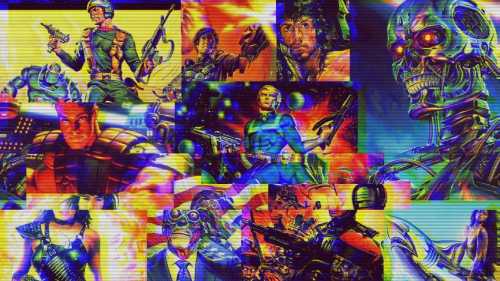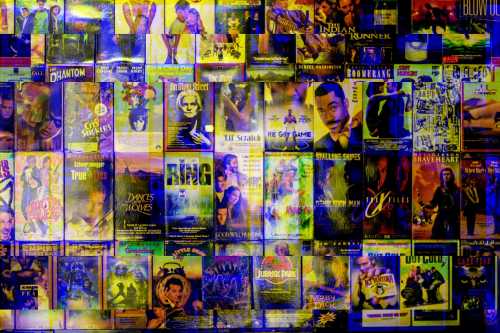Oh, the Winter Blues. It sounds like a song by an early-00s British indie rock band. It reads like subtitles to the sequel of a sci-fi steampunk light novel; and it’s been co-opted by the media to refer to the emotional meltdown we have during the Holiday season. Winter Blues (or the Holiday Blues) are inescapable, trendy, and hopelessly long-winded. During this season, you can’t scroll through a single line of React without needing to sink your soul into brain food that doesn’t require touching a keyboard (I mean movies here btw).
So, if you’re looking for relaxation and you’re sick of identical Marvel remakes that make your inner 9-yo cry, this article is the one for you. Jean-Luc Godard famously said that photography is truth, and cinema is truth 24 times per second. So yeah, let's get enlightened this winter: get comfortable, lay down in your bed or couch, grab some popcorn and get ready to watch some films (we won’t judge).
DISCLAIMER: This list is for those of you looking for more cerebral hidden gems.
Table of Contents
La Ciénaga
Aftersun
Portrait of a lady on fire
Never look away
Pierrot le fou
Love and Death
Fantastic Planet / La Planète Sauvage
Possession
La Ciénaga (2001)
Lucrecia Martel
If you’re suffering from the cold, La Ciénaga (Spanish for ‘the swamp’) will make you completely forget about winter. One of the remarkable feats of Martel’s film is that you can get completely immersed in it. You can almost feel the heat transmitted through the screen. This movie, directed by –according to the New York Times–Latin America’s preeminent filmmaker, Lucrecia Martel, takes place in northern Argentina. And since Argentina is in the Southern Hemisphere, north there means warmer weather. The year the film is set, Argentina went through a dire crisis. And it’s in this setting, that the movie comes to life, but a strange humid life at that. There is an almost decadent vibe to the movie. Martel captures perfectly what was going on in the minds of Argentinians, the doubt, the crisis, the utter sense of despair. In the film, nobody has control over other people. Events transpire and the characters go along in abandonment.
Aftersun (2022)
Charlotte Wells
This movie invites us to reflect on ‘warmth’ as an abstract concept, as a feeling somewhat spiritual. A now-grown daughter remembers her summer holiday with her father as a child. She does so through a combination of analog recordings, her imagination, and memories. It’s interesting to see how something frigid and material can get elevated to a level of spirituality through the use of human emotions. We’re transported to a different world, a world long gone. The filmmaker asks one thing: How can we revitalise that which has already happened? Do we have old home movies we could simply bring to life? The movie focuses on the special bond between a father and daughter, and examines the relationship between the past and the present.
Did you know Aftersun’s very own Paul Mescal got nominated for the Oscars for his performance?
Portrait of a Lady on Fire (2019)
Céline Sciamma
Keeping up with the topic of past events, the Portrait of a Lady on Fire has an exciting take on the subject of past flames, former loves, and what ‘could have been’ but was made impossible through a series of misfortunes. Set in 1770, the relationship between these two women was never even a possibility, it was doomed from the beginning.
The movie revisits the myth of Orpheus and Eurydice. The myth is mentioned throughout the movie, and the underlying theme is the story of a fated love that cannot be. But there is an intriguing twist: both characters are fully aware of the inevitable outcome of their relationship. The stare that (according to legend) cursed Orpheus and Eurydice is, in this case, intentional: they both knew it wouldn’t work, they knew it was forbidden, and yet, they choose to look at each other one last time, losing themselves in that act, but getting a final victory over destiny.
Never Look Away (2018)
Florian Henckel von Donnersmarck
This German film portrays the story of a young artist who is haunted (and at the same time enlightened) by his past. The story takes us to a passage between the former German Democratic Republic and the Federal Republic Germany, where the main character, Kurt, flees in search for spiritual and artistic fulfilment. The protagonist falls in love with a fellow student to whom he is unknowingly connected through a crime committed by her father under the Nazi regime. The title of the movie is taken from a quote in the film: ‘Never look away, Kurt. All that is true is beautiful.’ The search for truth and art are deeply entwined in this film. Much like Schopenhauer, Nietzsche, and Godard, this movie explores that correlation in a profound and beautiful way. It isn’t a light movie to watch, but Never Look Away is so immense in its scope, so outstandingly beautiful, that it’s almost an obligation to see it. It’s a masterpiece you didn’t know you needed to watch: it’s an invitation to never look away.
Pierrot le Fou (1965)
Jean-Luc Godard
Crime, adventure, fast cars, and mysterious gangsters. All of these elements appear in this masterpiece by Godard, they are essential to the story but they’re not what the movie is about. Like all early Godard films, this movie is elusive, and strange, and yet, it is vigorous and entertaining. It follows Ferdinand (Pierrot) who escapes his bourgeois life and family in the company of an old flame, Marianne, and embarks on dangerous adventures. The photography is exquisite, the plot is intricate and fun. Pierrot le Fou focuses on the contradictions that exist in modern society. A society where passion and existential routine clash, where one must choose between these two poles. Is fulfilment possible? What can we do in the face of uncertainty? How would we function in a society not ruled by capitalist obligations? These types of questions and other, entirely different ones (that is the beauty of movies directed by Godard), are raised. The film works as a mirror for our lives: what we take from it is what we’re willing to give back to it.
Love and Death (1975)
Woody Allen
Love and Death is a satire inspired by the great works of Russian literature. Russian winters are long and harsh, yet Woody Allen masterfully lights up this bleak ambient with laughter and tomfoolery, the signature mark of his early movies. He makes a mockery of the character he plays, Boris, a coward who is accidentally confused with a war hero. He calls upon the great works of Tolstoy, Dostoevsky, and others, and manages to express his thoughts on the fundamental issues revolving around love and death, and he does through comedy. If you need a superior laugh to warm up your gloomy winter days, Love and Death will surely do the trick.
Fantastic Planet / La Planète Sauvage (1973)
René Laloux
Dive into the fantastic animated world of Oms and Draags. This movie isn’t only visually stunning and thought-provoking, but it’s also very fun to watch. Through an experimental approach and in a sci-fi context, we learn about neocolonialism and the struggles of oppressed classes. Oms are human-like creatures who live on the planet of Draags, enlightened blue-skinned humanoids. The Oms are at most pets to the Draags, until one Om is accidentally educated. In some ways, it evokes the myth of Prometheus, as the Oms try to shake off the yoke of their ignorance and are then threatened with extermination. The main point of the Fantastic Planet is the struggle for a balance between different communities. In their struggle for dominance, both are faced with the almost inevitable fate of mutual destruction. This short movie is charged with an important message that resonates even louder in today's society. Not only is it an entertaining and exciting watch, but it is also a call-to-action, it poses questions and brings light to problems that are in urgent need of solutions.
Possession (1981)
Andrzej Żuławski
Nothing gets your blood running like a good scare! This Polish horror movie is set in a desolate and divided Berlin. It follows a woman who inexplicably abandons her life and her husband, who then follows her suspecting a love affair. The more he investigates, the more bizarre things get, and the affair that he suspected turns out to be something he never could imagine. This psychological thriller touches on the subject of divorce and the rupture of the nuclear family. It focuses on the effects these ruptures have on both sides, how the division leaves an impossible-to-fill absence, and how the opposing side (in each case) may take a monstrous form. It also focuses on the liberation of women, and how the world rejects this wish, by trapping them and turning them into ‘monsters.’ But Possession is impartial — it doesn't take sides in the matter, instead, it shows both sides in their brutal reality, it shows the demons that each one is facing. The film is shocking and scary, and it’s sure to make you forget about the cold outside for a while.
In conclusion
Watching films is a great way to pass the cold nights of winter. It gets you in touch with the arts and far from the keyboard (not the screen). So, if you’re done with talking about Rust and Go and you need a change from the cold logic of coding, go check out these rather artistic films.


